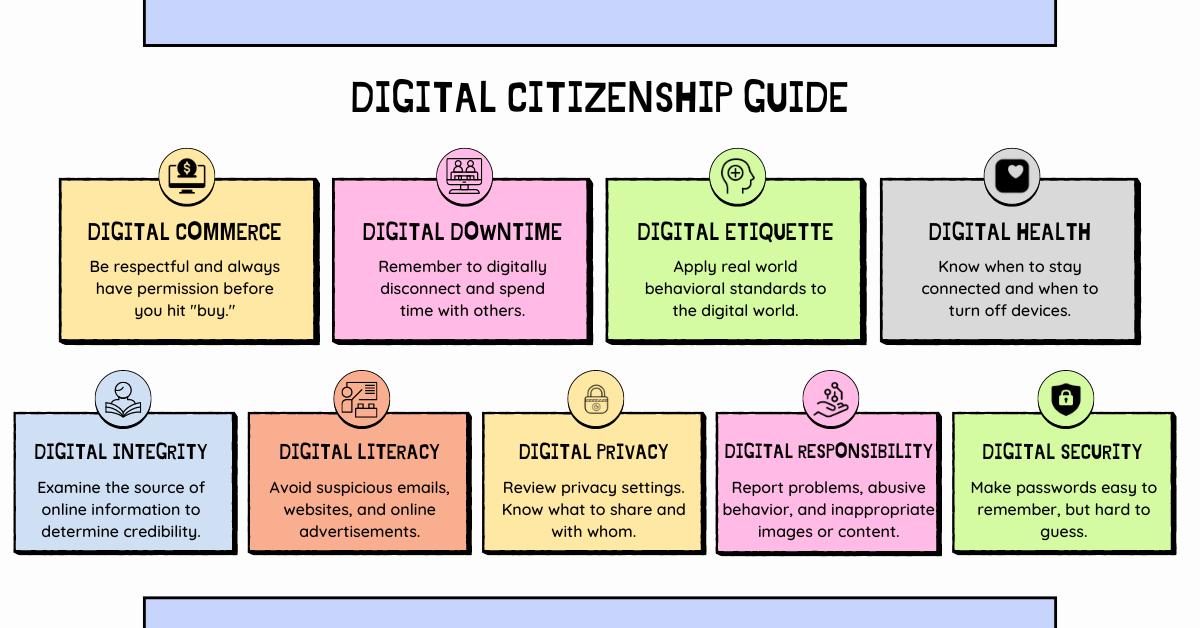In today’s digital age, every online interaction shapes our presence as digital citizens. Just as good citizenship is crucial in the physical world, responsible digital citizenship is essential for navigating the online world safely and respectfully. Here are nine important lessons to discuss with your children about being good digital citizens.
1. Digital Commerce
Kids today are growing up with the convenience of online shopping. They’ve seen packages arrive at the door and likely witnessed you making purchases for their needs. It’s crucial to teach them to always ask for permission before making any online purchases, even if your credit card details are saved on the app or website.
2. Digital Downtime
The pervasive use of smartphones and social media can often replace real human interactions. Encourage your teens to disconnect from their devices and engage in face-to-face interactions with family and friends. Utilize parental control apps and devices to manage screen time and ensure they develop essential social skills.
3. Digital Etiquette
Respectful online communication is as important as in-person interactions. Teach your children to be considerate and empathetic when sending messages. Encourage them to think about how their words might be perceived and to re-read messages before sending them. Let them know they can always come to you for help in proofreading or deciding if a conversation might be better had in person or over a call.

4. Digital Health
Balancing online and offline activities is key. Children should understand when it’s appropriate to be connected and when it’s time to put the phone away. Discuss specific times when you expect them to be fully present without their devices and set clear household rules regarding technology use. Lead by example to show the importance of digital health.
5. Digital Integrity
Children must learn to evaluate the credibility of online information. Teach them to scrutinize website URLs and look for clues such as the “https” tag or the site’s security status. Highlight the reliability of .edu and .gov sites over .biz or .info sites. Encourage them to be cautious of sites with invasive ads or poor grammar.
6. Digital Literacy
Kids should be wary of suspicious emails, attachments, websites, and advertisements. Instill in them the mindset that if something seems too good to be true, it probably is. Educate yourself on internet fraud, phishing, and online scams to better guide and protect your family’s personal information.
7. Digital Privacy
Privacy settings are crucial on all devices and platforms. While it might be unrealistic to expect children to read the fine print, you can teach them to use privacy settings effectively. Show them how to manage these settings and explain why certain apps need access to specific information. Regularly review and adjust their settings for enhanced digital safety.
8. Digital Responsibility
Just as children must report bullying at school, they should report cyberbullying and inappropriate online behavior. Teach them the importance of speaking up about abusive behavior and protecting themselves and others in the digital space.
9. Digital Security
Strong passwords are a fundamental aspect of online security. Teach your children to create robust passwords and change them regularly. Explain that passwords should be hard to guess but easy for them to remember, combining letters, numbers, and special characters. For example, a combination of their school name and a family member’s birth date can make a secure yet memorable password.
Ensuring your children’s safety online is a top priority. By teaching them these lessons, you guide them towards becoming responsible, respectful, and safe digital citizens. This knowledge will help them positively impact the digital world while protecting their personal information and well-being.




